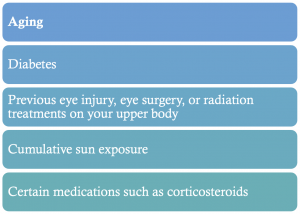What is a cataract?
Our eyes work a lot like a camera. When we look at an object, light rays reflect off that object and enter our eyes through the cornea. After light passes through the pupil, the dark opening in the centre of the eye, the lens, located behind the cornea, focuses the light rays onto our retina. This inner lens is called the crystalline lens.
What causes cataracts?
What are the common symptoms?
- Blurry vision
- Seeing double or ghosting of images
- Light sensitivity
- Difficulty with night vision
- Seeing bright colours as faded or yellow
- Increased glare and halos around lights
- Frequent changes in your glasses prescription
How can I prevent the development of cataracts?
At Bénoe, we strive to encourage healthy lifestyle choices to prevent or delay disease progression. Here are a few tips that you can adopt and share with your loved ones to slow the progression of cataracts:
- UV Protection
- Smoking Cessation
- Take care of any other health problems, especially diabetes
- Diet
- Vitamin C-rich foods: lemons, strawberries, kiwi, red bell pepper, cantaloupe and broccoli
- Beta-carotene rich foods: sweet potatoes, cantaloupes, kale and broccoli
- Fun fact: a sweet potato has more than 200% of the daily dose of vitamin A doctors recommend.
- Lycopene rich foods: tomatoes, watermelon, pink grapefruit, papaya, and dried
Are there any non-surgical options for management of cataracts?
- Get the right eyeglasses or contact lenses to correct your vision
- Use brighter lights for reading and other activities
- A magnifying glass may be useful, too
- Anti-glare glasses for driving
- Limit night driving if halos or glare become problems
When should I consider cataract surgery?
An ophthalmologist or an optometrist will know whether or not you have cataracts after examining your eyes. They will grade your cataracts and discuss with you if they are visually significant and require surgical removal. Everyone’s cataracts progress at different rates. If left untreated, cataracts will gradually worsen over time and may lead to permanent vision loss or even blindness. It is important to see your eye doctor regularly in order to detect cataracts early and plan an effective treatment approach.
With significant advances in surgical technique and technology, a natural eye lens with any degree of dysfunction can be safely removed and replaced with a lens implant with a high success rate. The decision to perform surgery is, therefore, based on the risks versus the benefits balanced against how the cataract interferes with personal lifestyle. When it becomes difficult for you to complete your regular activities or enjoy your hobbies, it is time to consider cataract surgery. It’s also recommended not to wait until the cataract is hyper-mature, which potentially makes the surgery more difficult and introduces higher risk.


